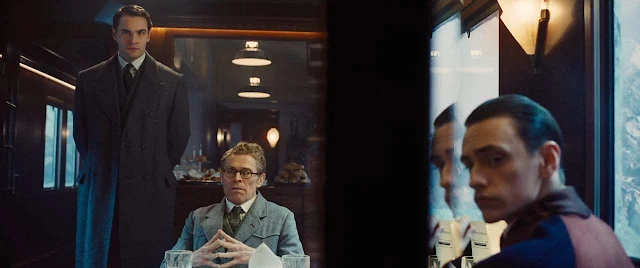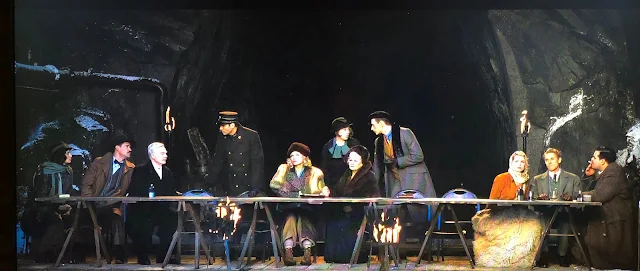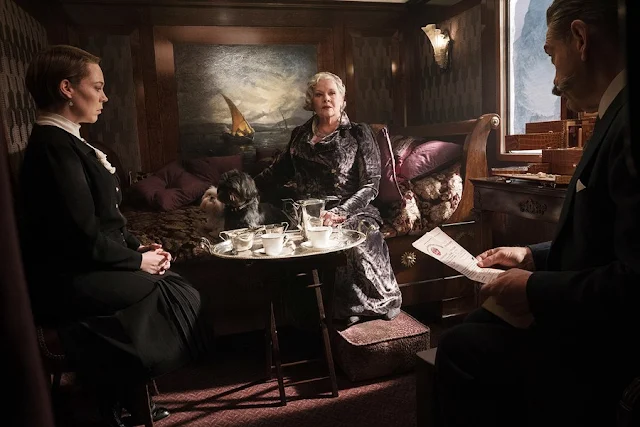
 Cast: Alessandro Nivola, Alicia Silverstone, Natascha McElhone, Kenneth Branagh, Carmen Ejogo, Matthew Lillard, Adrian Lester, Emily Mortimer, Richard Briers, Geraldine McEwan, Stefania Rocco, Jimmy Yuill, Nathan Lane, Timothy Spall. Screenplay: Kenneth Branagh, based on a play by William Shakespeare. Cinematography: Alex Thomson. Production design: Tim Harvey. Film editing: Dan Farrell, Neil Farrell. Music: Patrick Doyle.
Cast: Alessandro Nivola, Alicia Silverstone, Natascha McElhone, Kenneth Branagh, Carmen Ejogo, Matthew Lillard, Adrian Lester, Emily Mortimer, Richard Briers, Geraldine McEwan, Stefania Rocco, Jimmy Yuill, Nathan Lane, Timothy Spall. Screenplay: Kenneth Branagh, based on a play by William Shakespeare. Cinematography: Alex Thomson. Production design: Tim Harvey. Film editing: Dan Farrell, Neil Farrell. Music: Patrick Doyle.
A blog formerly known as Bookishness / By Charles Matthews
"Dazzled by so many and such marvelous inventions, the people of Macondo ... became indignant over the living images that the prosperous merchant Bruno Crespi projected in the theater with the lion-head ticket windows, for a character who had died and was buried in one film and for whose misfortune tears had been shed would reappear alive and transformed into an Arab in the next one. The audience, who had paid two cents apiece to share the difficulties of the actors, would not tolerate that outlandish fraud and they broke up the seats. The mayor, at the urging of Bruno Crespi, explained in a proclamation that the cinema was a machine of illusions that did not merit the emotional outbursts of the audience. With that discouraging explanation many ... decided not to return to the movies, considering that they already had too many troubles of their own to weep over the acted-out misfortunes of imaginary beings."--Gabriel García Márquez, One Hundred Years of Solitude
Search This Blog
Saturday, July 13, 2024
Love's Labour's Lost (Kenneth Branagh, 2000)
Saturday, August 27, 2022
Belfast (Kenneth Branagh, 2021)
Cast: Jude Hill, Catríona Balfe, Jamie Dornan, Judi Dench, Ciarán Hinds, Lewis McAskie, Lara McDonnell, Colin Morgan, Michael Maloney. Screenplay: Kenneth Branagh. Cinematography: Haris Zambarloukos. Production design: Jim Clay. Film editing: Úna Ní Dhonghaíle. Music: Van Morrison.
Viewing terrible times from the point of view of a child is a familiar movie trope: In 1987, for example John Boorman did it in Hope and Glory and Steven Spielberg in Empire of the Sun. And Kenneth Branagh did it quite well in the semi-autobiographical Belfast, set in the titular city during 1969, the year when his family decided to emigrate to England to escape the bloody conflict between Catholics and Protestants in Northern Ireland. Branagh has been a middling director of films except for his Shakespeare outings, particularly his Henry V (1989) and Much Ado About Nothing (1993) – I’d also include his Hamlet (1996), but it’s a little too gimmicky with its cameo roles for actors like Billy Crystal, Charlton Heston, and Robin Williams. Belfast, however, is a heartfelt personal project, which is its greatest strength but also – in a certain lack of distance and sentimentality in the storytelling – its chief weakness. The standout performances come from Catríona Balfe as the mother, whose grit and determination are finally undermined by the rioting, and Judi Dench and Ciarán Hinds as the grandparents. For once, Dench is not cast as a crusty old dame in the mode of her Queens Elizabeth I and Victoria, but rather as a sweet and slightly dotty old woman devoted to her husband, played also somewhat against type by Hinds. The whole thing is set to a score and songs by Van Morrison, another move in the film’s favor. Solid, somewhat old-fashioned moviemaking.
Thursday, February 13, 2020
All Is True (Kenneth Branagh, 2018)
 |
| Judi Dench and Kenneth Branagh in All Is True |
Saturday, March 16, 2019
Murder on the Orient Express (Kenneth Branagh, 2017)
Murder on the Orient Express (Kenneth Branagh, 2017)
Cast: Kenneth Branagh, Daisy Ridley, Leslie Odom Jr., Tom Bateman, Penélope Cruz, Josh Gad, Johnny Depp, Derek Jacobi, Michelle Pfeiffer, Judi Dench, Olivia Colman, Willem Dafoe. Screenplay: Michael Green, based on a novel by Agatha Christie. Cinematography: Haris Zambarloukos. Production design: Jim Clay. Film editing: Mick Audsley. Music: Patrick Doyle.
Wednesday, September 19, 2018
Dunkirk (Christopher Nolan, 2017)
Gibson: Aneurin Barnard
George: Barry Keoghan
Mr. Dawson: Mark Rylance
Peter: Tom Glynn-Carney
Farrier: Tom Hardy
Collins: Jack Lowden
Commander Bolton: Kenneth Branagh
Col. Winant: James D'Arcy
Shivering Soldier: Cillian Murphy
Alex: Harry Styles
Dutch Seaman: Jochum ten Haaf
Director: Christopher Nolan
Screenplay: Christopher Nolan
Cinematography: Hoyte Van Hoytema
Production design: Nathan Crowley
Film editing: Lee Smith
Music: Hans Zimmer
I've said it before: If a movie's story and performances are secondary to its spectacle, is it really a good movie? I'm sure Christopher Nolan's Dunkirk was something to see in an IMAX theater, but truth to tell, I'm just as happy to have watched it in HD on my 32-inch Samsung. I don't mind losing the giddy spectacle of riding the waves or flying in pursuit of German fighter planes, so long as there's real artistry in the storytelling, the acting, and the production. I've liked Nolan's work with some reservations since I first encountered it in Memento (2000). I admired his ability to revivify the Batman story, but found the films in his trilogy a little wearying. I was kind of bowled over by the audacity of the concepts and their execution in Inception (2010), but Interstellar (2014) made me fear the worst: that he was so infatuated with cutting-edge film technology and with far-out science fiction speculations that he might never come back down to Earth. So Dunkirk was a relief to me: This is traditional war-movie filmmaking with a splendid contemporary spin, mostly in the way the story is told through cuts back and forth in time. This so-called "non-linear" narrative technique bothered some traditionalists, but I found it both illuminated the characters and suggested some of the tension and chaos of the actual Dunkirk evacuation. Best of all, Nolan forgoes CGI for the most part, using actual ships and planes or convincing models of them, giving the action a much-needed solidity. He also doesn't yield to the temptation to lard his film with star cameos, letting mostly unknown young actors carry the burden of the story. The stars who do appear -- Mark Rylance, Tom Hardy, Kenneth Branagh, Cillian Murphy -- behave themselves, blending into the cast nicely. Hardy, for example, is capable of scene-stealing physicality, but he spends most of the film acting with only his eyes, the rest of his face covered by his pilot's breathing apparatus. (When he's liberated from that restriction at the end, I almost feared for the Germans who captured him.) Every genre movie has its clichés, of course, but a good writer and director -- Nolan is both -- knows how to work them, how to avoid stumbling over them and instead give them just enough weight to satisfy our expectations, as he does in the scene in which the returning soldiers, fearful that they'll be cursed and spat upon for losing the battle, are greeted at the train station with people cheering and handing them bottles of beer. He also handles the celebrated speech by Winston Churchill with finesse, never introducing Churchill as an on-screen character and having the speech itself read by the rescued men, as it should be. It's as stirring a moment as one could wish.




























